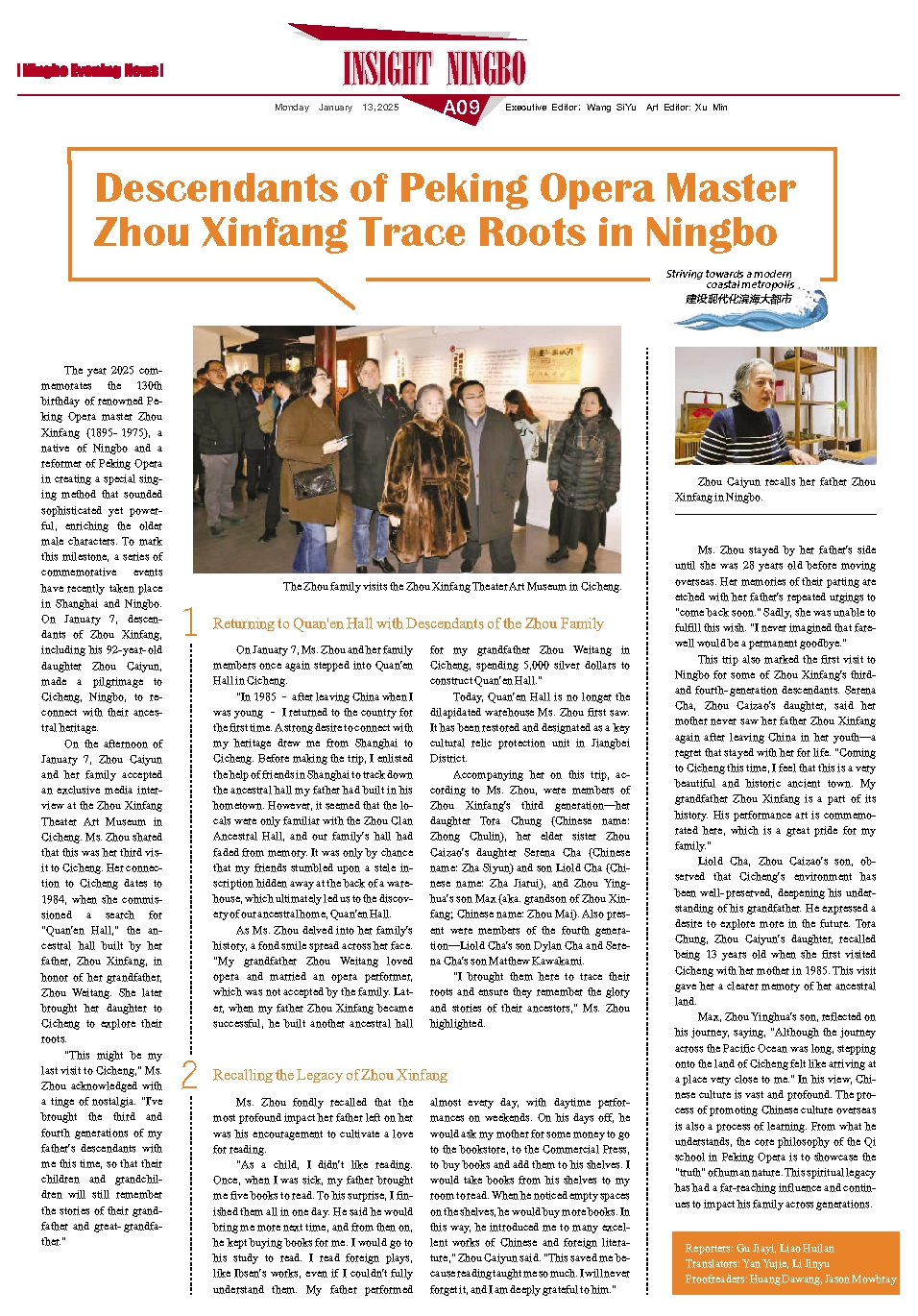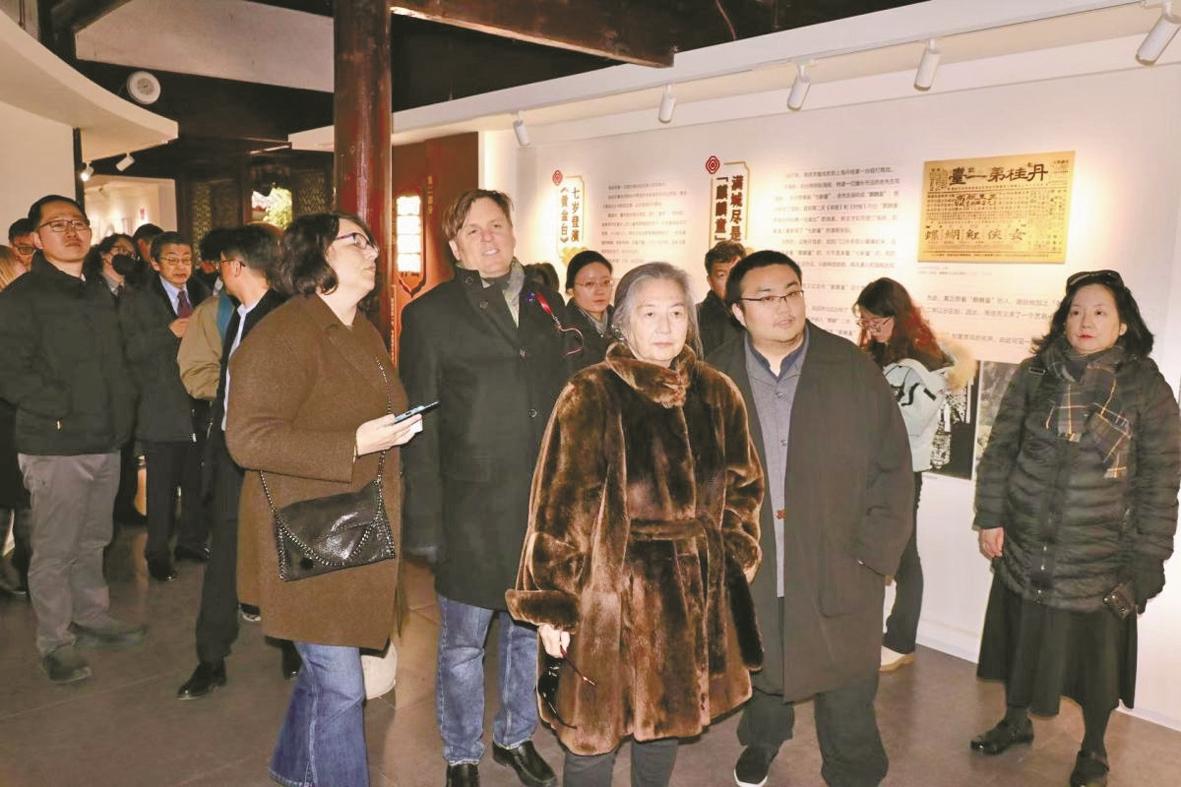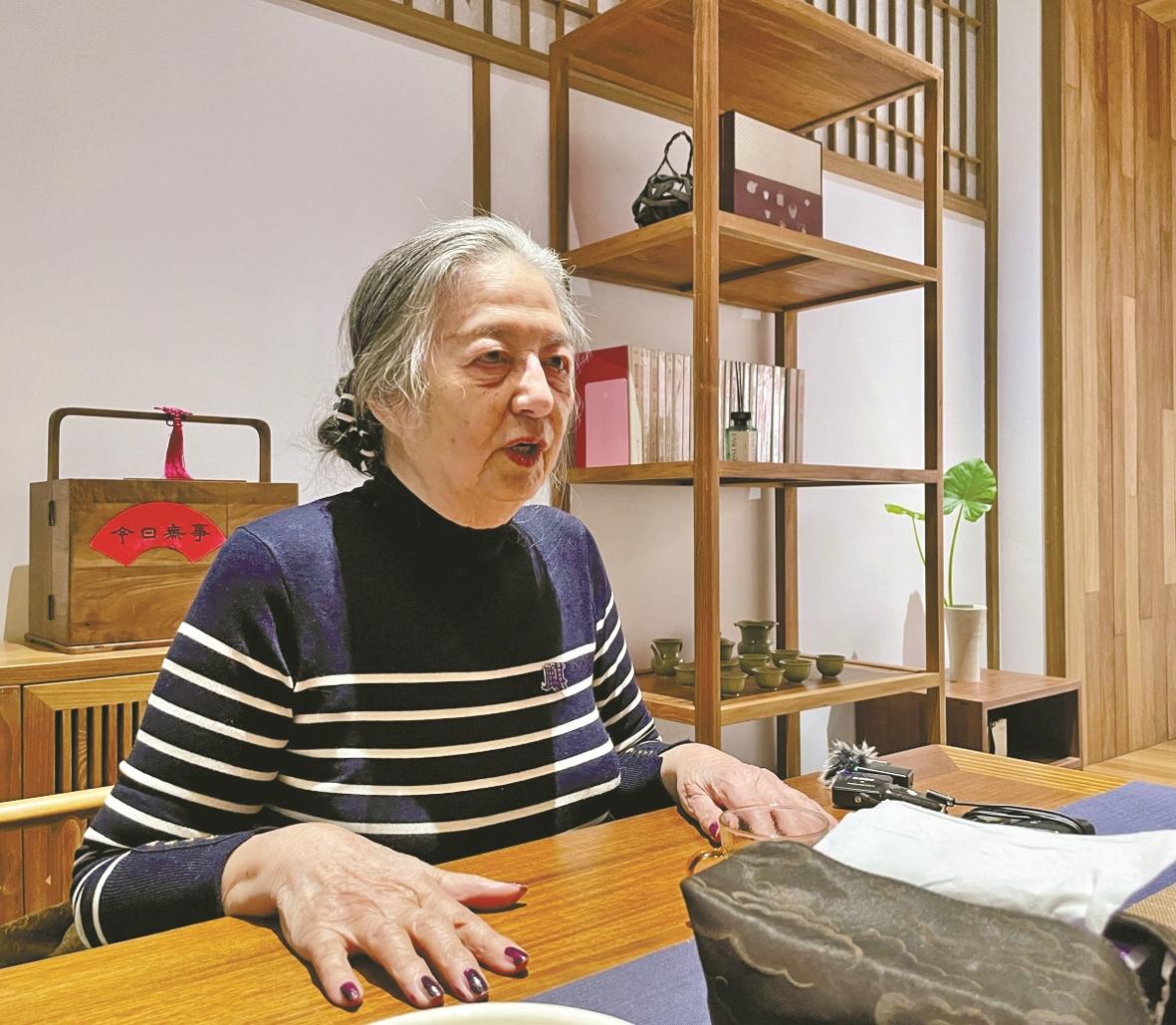The year 2025 commemorates the 130th birthday of renowned Peking Opera master Zhou Xinfang (1895-1975), a native of Ningbo and a reformer of Peking Opera in creating a special singing method that sounded sophisticated yet powerful, enriching the older male characters. To mark this milestone, a series of commemorative events have recently taken place in Shanghai and Ningbo. On January 7, descendants of Zhou Xinfang, including his 92-year-old daughter Zhou Caiyun, made a pilgrimage to Cicheng, Ningbo, to reconnect with their ancestral heritage.
On the afternoon of January 7, Zhou Caiyun and her family accepted an exclusive media interview at the Zhou Xinfang Theater Art Museum in Cicheng. Ms. Zhou shared that this was her third visit to Cicheng. Her connection to Cicheng dates to 1984, when she commissioned a search for "Quan'en Hall," the ancestral hall built by her father, Zhou Xinfang, in honor of her grandfather, Zhou Weitang. She later brought her daughter to Cicheng to explore their roots.
"This might be my last visit to Cicheng," Ms. Zhou acknowledged with a tinge of nostalgia. "I've brought the third and fourth generations of my father's descendants with me this time, so that their children and grandchildren will still remember the stories of their grandfather and great-grandfather."
Returning to Quan'en Hall with Descendants of the Zhou Family
On January 7, Ms. Zhou and her family members once again stepped into Quan'en Hall in Cicheng.
"In 1985 – after leaving China when I was young – I returned to the country for the first time. A strong desire to connect with my heritage drew me from Shanghai to Cicheng. Before making the trip, I enlisted the help of friends in Shanghai to track down the ancestral hall my father had built in his hometown. However, it seemed that the locals were only familiar with the Zhou Clan Ancestral Hall, and our family's hall had faded from memory. It was only by chance that my friends stumbled upon a stele inscription hidden away at the back of a warehouse, which ultimately led us to the discovery of our ancestral home, Quan'en Hall.
As Ms. Zhou delved into her family's history, a fond smile spread across her face. "My grandfather Zhou Weitang loved opera and married an opera performer, which was not accepted by the family. Later, when my father Zhou Xinfang became successful, he built another ancestral hall for my grandfather Zhou Weitang in Cicheng, spending 5,000 silver dollars to construct Quan'en Hall."
Today, Quan'en Hall is no longer the dilapidated warehouse Ms. Zhou first saw. It has been restored and designated as a key cultural relic protection unit in Jiangbei District.
Accompanying her on this trip, according to Ms. Zhou, were members of Zhou Xinfang's third generation—her daughter Tora Chung (Chinese name: Zhong Chulin), her elder sister Zhou Caizao's daughter Serena Cha (Chinese name: Zha Siyun) and son Liold Cha (Chinese name: Zha Jiarui), and Zhou Yinghua's son Max (aka. grandson of Zhou Xinfang; Chinese name: Zhou Mai). Also present were members of the fourth generation—Liold Cha's son Dylan Cha and Serena Cha's son Matthew Kawakami.
"I brought them here to trace their roots and ensure they remember the glory and stories of their ancestors," Ms. Zhou highlighted.
Recalling the Legacy of Zhou Xinfang
Ms. Zhou fondly recalled that the most profound impact her father left on her was his encouragement to cultivate a love for reading.
"As a child, I didn't like reading. Once, when I was sick, my father brought me five books to read. To his surprise, I finished them all in one day. He said he would bring me more next time, and from then on, he kept buying books for me. I would go to his study to read. I read foreign plays, like Ibsen's works, even if I couldn't fully understand them. My father performed almost every day, with daytime performances on weekends. On his days off, he would ask my mother for some money to go to the bookstore, to the Commercial Press, to buy books and add them to his shelves. I would take books from his shelves to my room to read. When he noticed empty spaces on the shelves, he would buy more books. In this way, he introduced me to many excellent works of Chinese and foreign literature," Zhou Caiyun said. "This saved me because reading taught me so much. I will never forget it, and I am deeply grateful to him."
Ms. Zhou stayed by her father's side until she was 28 years old before moving overseas. Her memories of their parting are etched with her father's repeated urgings to "come back soon." Sadly, she was unable to fulfill this wish. "I never imagined that farewell would be a permanent goodbye."
This trip also marked the first visit to Ningbo for some of Zhou Xinfang's third- and fourth-generation descendants. Serena Cha, Zhou Caizao's daughter, said her mother never saw her father Zhou Xinfang again after leaving China in her youth—a regret that stayed with her for life. "Coming to Cicheng this time, I feel that this is a very beautiful and historic ancient town. My grandfather Zhou Xinfang is a part of its history. His performance art is commemorated here, which is a great pride for my family."
Liold Cha, Zhou Caizao's son, observed that Cicheng's environment has been well-preserved, deepening his understanding of his grandfather. He expressed a desire to explore more in the future. Tora Chung, Zhou Caiyun's daughter, recalled being 13 years old when she first visited Cicheng with her mother in 1985. This visit gave her a clearer memory of her ancestral land.
Max, Zhou Yinghua's son, reflected on his journey, saying, "Although the journey across the Pacific Ocean was long, stepping onto the land of Cicheng felt like arriving at a place very close to me." In his view, Chinese culture is vast and profound. The process of promoting Chinese culture overseas is also a process of learning. From what he understands, the core philosophy of the Qi school in Peking Opera is to showcase the "truth" of human nature. This spiritual legacy has had a far-reaching influence and continues to impact his family across generations.




